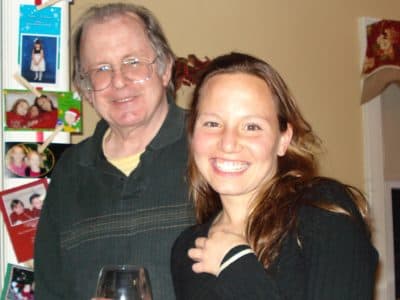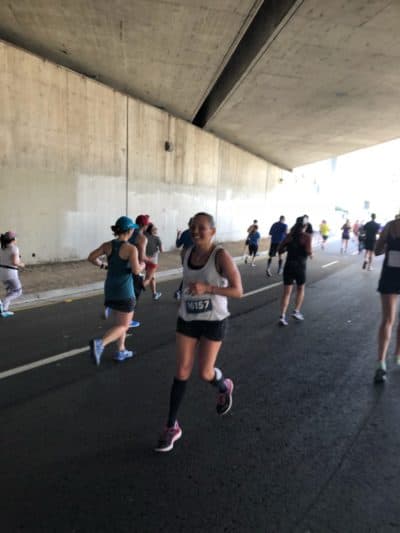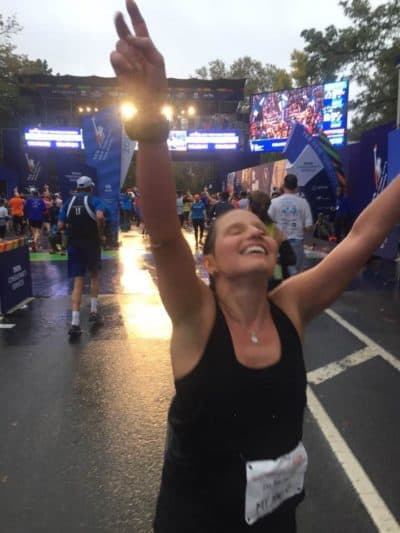Advertisement
Why Justine Galloway Runs Backwards
ResumeJustine Galloway started running because of her dad.
"When I was a little girl, he would do his marathon training — and the last block, he would basically pick me up, and I'd go for a run around the block with him," Justine says.
Justine grew up in Teaneck, New Jersey. Her father, James, was a civil engineer. And for that final block, Justine would try to outrun her dad.

"I'm pretty sure he let me win," Justine says. "Regardless, he had ran 20 miles, so I think my legs were a little fresher."
But when Justine was 6 years old, the family learned that James had Parkinson’s disease.
For a few years, James continued to run. He even completed a marathon after his diagnosis. But eventually, he had to stop.
Justine says she really started to understand what the disease meant when she was 10 years old. That’s when her dad was laid off from his job.
"And we think it's because they knew he had Parkinson's," she says.
Justine’s mom, Virginia, went back to work as an office manager.
"So it just kind of changed our whole family dynamic," Justine says. "But I think because my dad was laid off, I interacted with my dad a lot more. And had the opportunity to really spend time with him."
Justine jokes they'd spend their time together fighting over the remote.
"And we’d just talk about normal stuff," she says. "We’d disagree about politics, but I was young at that point. But as I got older, I talked a lot about my running with him."
Following Dad's Footsteps
While the disease had forced James to give up the sport, Justine kept going.
"I mean, running always came really easy to me," Justine says. "It was kind of mindless. I could go forever."
Justine ran in high school. Her dad would always pick her up from her meets. In 1998, she went to Rutgers to study engineering. As a sophomore, she walked onto the cross country and track teams.
Justine never raced more than five kilometers. But when her college running career was over, she started taking on longer distances.
"Watching my dad do the marathons, I always wanted to do it," she says.
Justine ran her first marathon, New York City, in 2002. She ran it again in 2004. And while James couldn’t join Justine for the final block of her training runs, he found other ways to be involved.
"When I used to complain about not wanting to run, he was the person who'd be like, ‘Stop complaining and go run,’ " she says.
Justine ran Boston and Philadelphia. At the 2009 New York City Marathon, she set a personal record at 3 hours and 16 minutes.
A year later, just before she turned 30, her father passed away.
"I always thought my dad was going to outlive all of us," Justine says. "Just because, with Parkinson's, it's a horrible disease — but you live with it, right? So I think it was a shock to all of us. But I remember that week going for a run. And I just felt like the run meant so much more.
"He was a runner. I am a runner. And I think that's one thing we always had in common — no matter what we disagreed on — was our joy of running. So I just remember going for a run that week, and it was awesome. I was connecting to him."
A year later, Justine entered the Boston Marathon.
During the race, she felt like something was wrong. She was slow. She thought maybe her electrolytes were low. At Mile 18, she dropped out. Justine figured it was just an off day.
In fact, it would be six years before she’d attempt another marathon.
Something Wrong
A few weeks after dropping out of Boston, Justine fell during a run. A week or so later, she noticed something was off with her stride.
"My left leg started staying up in the air too long," she says. "And then when it would come down, it would kind of swing out to the left. I couldn't describe the injury. I just knew I wasn't able to run — like, it wasn't mindless any more. My left leg was just — it felt like a piece of wood, and I was just dragging my leg with me."
It started to affect Justine’s walking, too.
"It got to the point where I would have to walk to the grocery store, and I'd start to cry," Justine remembers. "Because it took so much out of me to walk there. Because my left leg just wasn't responding."
“It's like the wiring from your brain to your leg is fried.”
Justine Galloway
Justine saw doctors: orthopedists and eventually neurologists.
"A lot of the doctors I would see were like, ‘I don't know what this is, so it must not be anything — and therefore you're fine,’ " Justine says. "It was extremely frustrating. Just because I felt like no one was listening to me."
After about a year and a half of doctors’ visits, one neurology resident had an idea: maybe she had something called dyskinesia, an involuntary movement that sometimes affects individual body parts.
"I started googling ‘dyskinesia’ and ‘runner's dyskinesia,’ " Justine says. "And I found an article on runner's dystonia. Basically, the article said it happened to endurance runners around their 30s — which is weird, because that's how old I was — and that they would have, their leg would not respond.
"And they compared it to if you played Mozart your whole life, and then all of a sudden you couldn't play that one song — it's like your finger forgot how to do it. And so I brought in the article, and the neurologist was like, ‘Oh, my god. This is what you have.’ "
Justine finally had an explanation for why she could no longer run: runner’s dystonia.
"The way I explain it — and obviously, I'm sure a lot of people could explain it a lot better — but it's like the wiring from your brain to your leg is fried," Justine says.
Justine says she isn't sure whether it's just a coincidence that her father had Parkinson's and that she has runner's dystonia.
"But I just — in some ways, I kind of found it ironic. Because I watched my dad lose running. And I was like, ‘I'll never lose running until I have to,’ " she says. "And I didn't think I was going to have to make that decision at 31. I thought I'd make that decision in my 70s or my 80s."
Without running to anchor her, Justine decided to leave New Jersey in 2013.
“I was like, ‘I'm done with the running community.’ ”
Justine Galloway
"A lot of my friends in New Jersey were runners, and I was like, ‘I'm done with the running community,’ " she says. "And I came out to California, and I was going to swim and bike. And I was going to swear off all runners."
A Turn For The Better
And here’s where I need to tell you about one important discovery Justine had made during her physical therapy.
Sometimes during treadmill work, her physical therapist would ask her to run backwards.
"And I would be like, ‘I could do this forever,’ " she recalls. "And it was weird that I could do it forever."
Justine connected with another woman with runner’s dystonia who had discovered the same thing.
"And so, when I was talking to her, the other thing she says she does is, like, zig-zag running," Justine says. "So it seems it's just confusing your brain enough."
So after Justine moved to San Diego in 2013, she started going for runs — backwards. At first, she fell a lot.

"I started running longer and longer backwards," she says. "Like, five-mile runs and six-mile runs. And eight-mile runs. And it felt good. It felt — there was a different toll on my body, because you're not meant to run backwards. But from a mindless standpoint, I was able to get into that zone where it was mindless — where I didn't have to think about how to run backwards. I just ran backwards."
Justine joined a running club. She developed a technique for falling that minimized damage. And in 2014, she ran her first backwards half marathon. (Her brother went with her to make sure she didn’t run into anything.)
In 2015, running with her brother, sister and future husband, Dustin, she finished a half marathon in 2 hours and 46 minutes. It was more than 1 hour and 15 minutes slower than her best forward time — but it gave her the Guinness World Record for fastest backwards half marathon.
Then in 2017, six years since she’d dropped out of Boston, Justine entered the New York City Marathon. She was raising money for Parkinson’s research.
Running forward, Justine had once finished New York in 3 hours and 16 minutes. Running backwards, it took her 6 hours and 6 minutes.
"Which was probably the hardest thing I’ve ever done in my life," she says.
Justine explains that, going backwards, you land on your forefeet over and over again. After hours of running, she says, it felt like she had no more flesh on the balls of her feet.
Moving Forwards — Backwards
Today, Justine is an engineer and project manager. She’s able to walk forward comfortably now. She’s not sure if she’ll ever run another marathon, but she plans to keep on running ... backwards.

"I find it to be more rewarding than I did running forward," she says. "And a different kind of rewarding. Not rewarding like, ‘I’m gonna break this time’ or, ‘I may come in this place in my age group.’ But more rewarding like, ‘Holy crap. I just ran 11 miles backwards. That’s cool!’ "
Justine says she doesn't think she'd still be running today if she hadn't seen what her father went through.
"No. I think seeing my dad go through what he went through has made me want to continue my running — and the backwards part is just the way I do it," she says. "My dad was a very funny guy — very sweet guy and a very funny guy. And I think he'd get a kick out of me running backwards. I’m sure he’d have some ideas of shirts I should wear or something. But my dad was always happy for me and always proud of me."
And not that it really matters ... Justine lost that Guinness record a couple years ago. But don’t worry — she may have just set it again last weekend with a backwards half marathon time of 2 hours, 19 minutes and 45 seconds. The Guinness people still have to certify it.
This segment aired on January 26, 2019.
